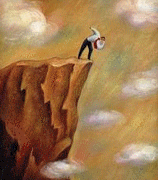FINANCIAL ACROPHOBIA RELATED TO THE ISSUE OF “WHEN”
In life, "when" matters.
If your coworkers see you out drinking at 8pm, they will consider you a fun loving guy who enjoys himself after work. However, should your coworkers see you out drinking at 8am, they will consider you an alcoholic who probably won't be their coworker too much longer.
To illustrate further, if you take a plate of warm cookies to a new neighbors house at 3pm, you will be considered hospitable and kind. If you take a plate of warm cookies to a new neighbors house at 3am, you will be considered creepy, weird and possibly get shot depending on your geographical location.
Yes, "when" does indeed matter in life.
In the markets, however, the issue of "when" is much less relevant. This is contrary to the popular wisdom that insists on timing being such an important facet of the investor experience. Obsessing over "when" for investors is one of the biggest stumbling blocks to profits. It creates trepidation, doubt and anxiety that would not come into the equation if the issue of "when" was left in the realm of life and out of the realm of finance.
In the past, I've touched on what truly separates an amateur investor from a professional investor. It surely is not a degree, a certificate, any level of training or anything pedigree related, for that matter. I have seen retail investors that could have been all-star fund managers. I have seen fund managers who shouldn't be trading a $20,000 retail account, let alone a $200,000,000 portfolio of retirement assets.
True Wall Street professionals, I have found, are much less involved with the issue of "when" in the traditional sense. They are able to buy high and sell higher. They are able to look at the issue of "when" in a much more relative sense, as opposed to the traditionally minded investor who comes into the Wall Street arena with the same tools he uses in everyday life. The very same tools that Wall Street inherently preys upon.
Much along the lines of fear and greed. The same emotions that will keep you out of a dangerous part of town at night and keep you motivated when you want to give up. These emotions have no place in the investment world. They are stumbling blocks. The obsession over "when" falls right in line with fear and greed as a classic stumbling block for experienced and less-experienced investors alike.
Let's take the market of present day as an example. "When" is killing the average investor here. They are looking at the market from a standpoint of 2009, when the Dow was at 7,000. Google was at 250 and Starbucks at 10. They see that years have passed with a tremendous amount of appreciation taking place. The issue of "when" becomes the top floor of the Empire State Building, with one foot hanging out of the window looking down. That is the appearance the market has to investors who become obsessed by "when."
The experienced investor is able isolate "when" into windows of time. They have enough experience with the markets to be able to compartmentalize the various phases of a bull market. The 2009 bottom for the S&P at 666.79 has nothing to do with the current level of 1675.02. They are different windows of time that have no bearing on one another. Even closer periods of time, such as when the Dow was at 14,551 a couple of weeks ago. That is another window of time that has nothing to do with 15,460 level that we are sitting at now.
Those without perspective - in other words those who are involved in the realm of "when" - have great difficulty buying into strength. The "when" becomes overbearing. It has been X amount of days. The market has gone up X amount of points. There is no isolation of time. "When" becomes the be and end all.
Even when they are able to muster up the strength to buy, there is no staying power. It is essentially financial acrophobia. Rational functioning ceases to exist.
Some who suffer from financial acrophobia can be cured through a strict regimen of investment discipline that will instill the confidence necessary to function regardless of the time and place where the market is residing. Unfortunately, a vast majority of those who suffer from this malady will eventually leave the markets with a sense of ill will towards all capitalistic endeavors involving speculation utilizing imperfect information.
What causes their departure is not the acrophobia itself. But rather, they leave because the acrophobia is replaced by the more powerful emotion of greed. It is only when the markets become rich with the saliva of investors drooling over each other to take another dollars out of their favorite stock that financial acrophobia disappears. The results are then equal parts predictable and disastrous.
Financial acrophobia deserves a place right next to fraud, the bursting of asset bubbles and recessions as a powerful exterminator of both investment capital and the investors who decide to deploy it without knowledge of their own limitations.

